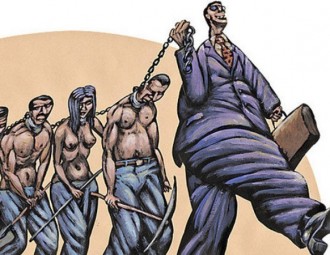Gennadz Fiadynich: If a person cannot get retirement from work it is a real slave labor

The report of the United States Department of State doesn’t fully describe the problems of forced labor in Belarus.
Belarus degraded to the lowest possible, third level in the annual “Trafficking in Persons Report 2015” prepared by the U.S. State Department on human trafficking and forced labor in 188 countries of the world. US President has a right to introduce sanctions against the countries that are in the third group.
Sarah Sewall, Under Secretary of State for Civilian Security, Democracy, and Human Rights at the U.S. State Department stated that the countries of the third level (23 countries altogether) are not only below the minimal standards when it comes to fight on human trafficking and forced labor, but also don’t make enough efforts for such fight.
By and large, Belarus is surrounded by Algeria, Belize, The Gambia, Iran, North Korea, Libya, Russia, Syria, Thailand, Yemen, Venezuela, Zimbabwe…
Does the US have grounds for counting Belarus among sheer outsiders? Gennadz Fiadynich, the Chairman of the Belarusan Trade Union of Radio Electronic Industry answered the questions of the “EuroBelarus” Information Service.
- If the US State Department lowered Belarus’ level, there should be grounds for that.
Earlier the EU assumed that Belarus is a barrier for illegal migrants and one of the main fighters with human trafficking, and the official Minsk echoed these theses as if they were mantras.
Human trafficking is to this or that degree present in all countries, but CIS countries are doubtless leaders. If such facts are present in Belarus, society should know about them. That is why I would call for the US State Department to publish all known facts for the Belarusan society.
- The US State Department finds “Subbotniks” (days of so-called “obligatory volunteer” work for state sector employees mostly organized for cleaning the streets of garbage, fixing public amenities, collecting recyclable material, and other community services – EuroBelarus) to be forced labor. How legal is such assessment?
- In the 90s the tradition to organize voluntary Subbotniks stopped, but Lukashenka put it to life, and is demonstratively working himself together with the Prime Minister.
Each April the authorities are making people clean the city, whereas cleaners in the rest of the world are earning their money by cleaning the streets in spring and autumn and cleaning snow in winter.
But our authorities are still living in Soviet times. It’s a huge minus of the state cause everyone should do their own work: doctors should treat the ill, bricklayers - build walls and houses, and the head of state – govern the country. Only then we will have order and won’t have to organize forced-voluntary Subbotniks.
One more question is who apart from the authorities knows where money from Subbotniks goes? If people knew that the money they earned during Subbotniks went for some concrete things such as computers for an orphan home, ultrasound machine for the local hospital, if people saw the final result of their labor they would treat Subbotniks differently.
But for now Subbotniks in Belarus is forced “voluntary” labor.
I am alarmed by a different fact. Subbotniks happen in April, but contract system has been now working for decades. If a person has signed a contract and found a better job, he or she still cannot retire – this is what the real forced is about. State should be punished with sanctions for contract system that turns citizens into slaves. A person should be free in his or her choice of profession and place of work.
From my point of view and from the point of view of my colleagues the report of the .S. State Department doesn’t fully describe the problems of forced labor in Belarus.
- Sarah Sewall, Under Secretary of State stated that the US President has a right to introduce sanctions that are not related to the humanitarian and trade cooperation against the countries that are in the third group. What kind of sanctions can the US introduce?
- Obama has 90 days to sign the corresponding documents for introducing sanctions. I am sure that there is a whole line of cultural and educational projects in Belarus sponsored by the US. If White House considers sanctions, they should know what they are talking about: they can only take away what they’ve given us.
But it is something different that is unclear for me: why are the US and the EU demonstrating not very coordinated policy towards the official Minsk? If the problem does exist, why not come to Minsk and ask us – we have been talking about working contracts for decades now. None of the countries in the world has such absurdity that Belarus has. Mass children labor is hardly a problem for Belarus, whereas contract system is very painful for the working class.
- Why is the EU disregarding such trifles after Lukashenka has turned into perhaps the most important peacemaker on Ukraine, while the US is still indicating all violations in Belarus?
- The US has enough of its own problems in public life. But we should pay the tribute to Americans – they hold to their principles: if there are violations they should be fought with. Obviously, the EU decided to make several steps back and disregard the situation in Belarus. Disregard of Belarus is the best variant for the EU: there is Russia, Ukraine, and Greece. The less questions come the less answers are required.
-
03.01
-
07.10
-
22.09
-
17.08
-
12.08
-
30.09



























